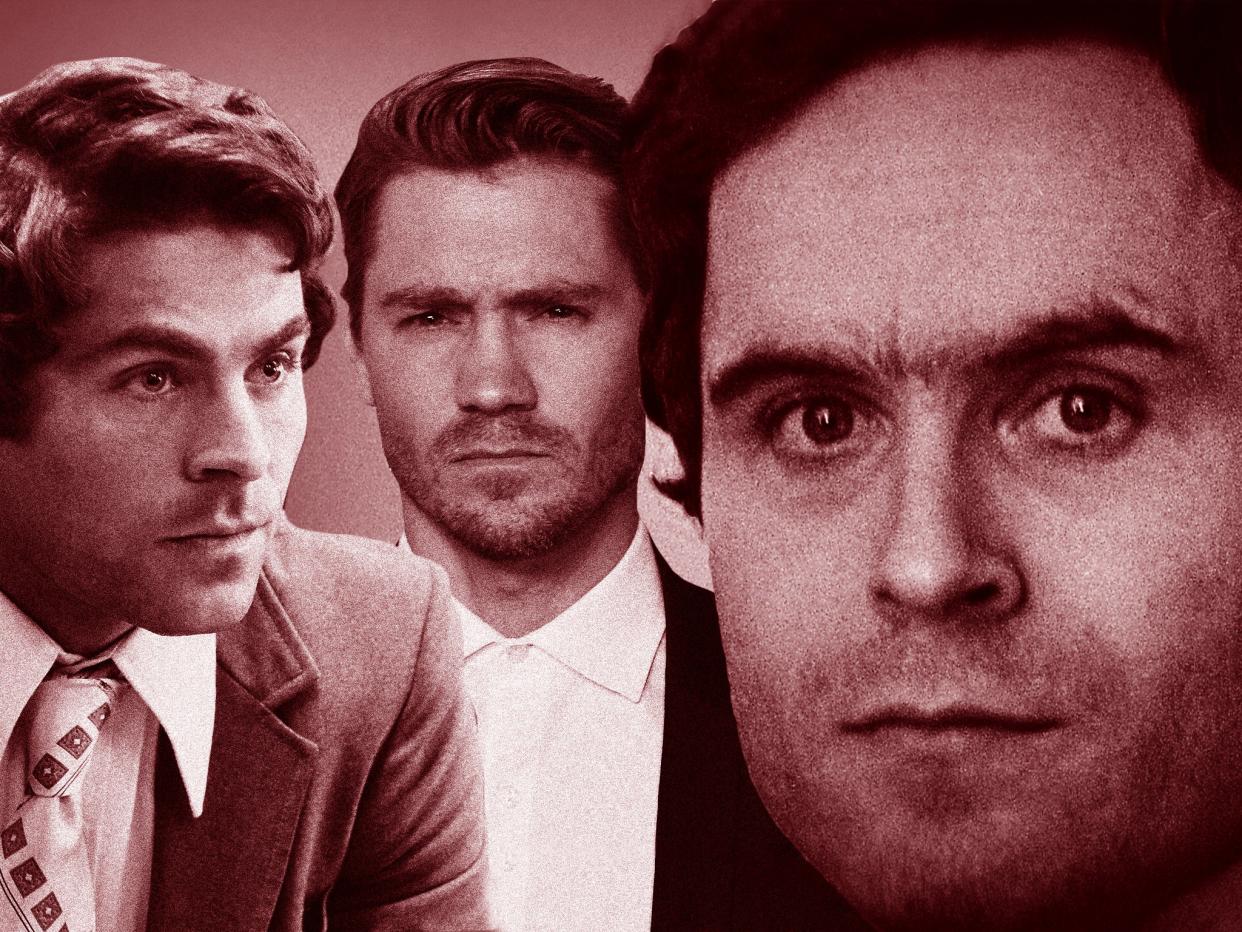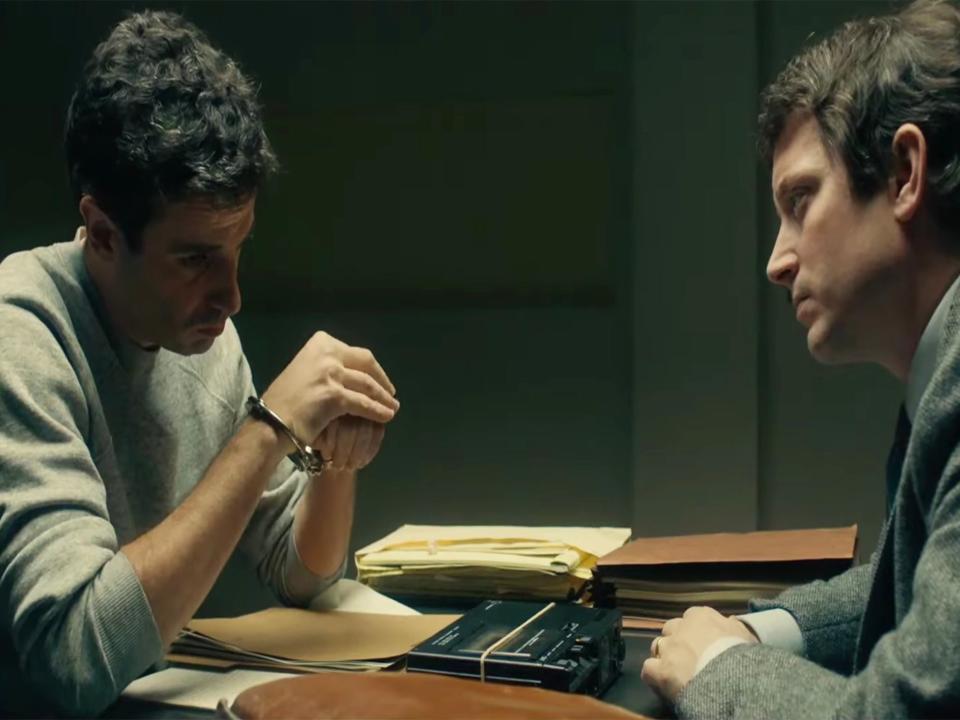Ted Bundy was neither sexy nor a genius – when will Hollywood stop glorifying him?

- Oops!Something went wrong.Please try again later.
Another year, another film about Ted Bundy. Actually, make that two. Social media was less than thrilled last weekend as the trailers dropped for both American Boogeyman (starring One Tree Hill veteran Chad Michael Murray) and No Man of God (starring Luke Kirby and Elijah Wood) – two more films about the 20th-century American serial killer, who likely murdered at least 30 women but is estimated by some to have killed up to 100.
Since Bundy’s rise to infamy in the 1970s – fuelled in part by how many he had killed, but also by the gruesome nature of his murders – his story has been no stranger to our screens. It was told in the 1986 TV miniseries The Deliberate Stranger, the 2002 movie Ted Bundy, the 2003 film The Stranger Beside Me, the 2004 film The Riverman, and the 2007 film Bundy: A Legacy of Evil. You might have thought his legacy would have gradually faded over time, but in the last couple of years, the churn of Bundy stories has only ramped up. In 2019 alone, Zac Efron starred in the Netflix movie Extremely Wicked, Shockingly Evil and Vile, while Bundy’s killings were explored in the documentaries Conversations with a Killer – also for Netflix – and ABC’s 20/20: Bundy. In 2021, we don’t need any more Bundy stories. So why on earth are they still getting made?
It’s no secret that audiences are suffering from a true-crime obsession in both the US and the UK, sparked in 2014 by the podcast Serial, which reinvestigated the 1999 murder of schoolgirl Hae Min Lee and is still widely cited as the most listened-to podcast on record. Today, true crime continues to dominate the podcast world, while the genre also ranks among Netflix’s most popular categories, with shows and films like Tiger King, Don’t F**k with Cats and Why Did You Kill Me? among the platform’s most watched.
The churn of morbid stories reflects a mutually beneficial relationship between viewers and filmmakers. Hannah Woodhead, a critic at the film magazine Little White Lies, told me earlier this year that retelling stories like Bundy’s is “a win-win for producers”: writers can work from the abundant films already existing on the topic, and also have a guaranteed audience who are familiar with the story. Even more useful (in a producer’s eyes) is the amount of source material that surrounds Bundy, given he had so many victims.
But online audiences are right to criticise the never-ending conveyor belt of stories about the serial killer. Through immortalisation in print and on screen, it’s safe to say that Bundy has reached a sort of mythic status in the public consciousness, with certain distortions and half-truths being repeated again and again. Most notably, many Bundy films buy into the idea that the serial killer was irresistibly handsome – which is propped up by the casting of Noughties heartthrobs like Efron and, now, Murray. But as philosopher and writer Tom Whyman has argued: “When one looks at pictures of Bundy, ‘handsome’ never seems quite right.” In fact, police frequently cited Bundy’s “chameleon-like appearance” – he was an average-looking, brown-haired white guy – as one of the core reasons he was so difficult to capture.
Then there is the myth of personality that surrounds Bundy’s legacy. Dramatisations have historically painted the serial killer as an evil genius who also seemed incredibly harmless on the surface. This concept rears its head in the American Boogeyman trailer, which shows police scratching their heads over his murders. We then see Bundy plotting in his car, with voice-overs reiterating that he was indeed a “good son”. The teaser for No Man of God also goes for the “intelligent enigma” trope. Over dramatic strings, we’re warned: “He will cat-and-mouse with you – he will make you think you are getting somewhere.” It’s embarrassingly cheesy. Crucially, I’m not sure it’s true.
Bundy’s curious ability to commit crimes in broad daylight was undoubtedly helped by the fact that he was a well-to-do white man. When six young women disappeared from Seattle in the summer of 1974, and a further two were then abducted from a crowded beach during the day, witnesses reported that Bundy had approached them and introduced himself by his real name. This information was publicised alongside a victim sketch. But after four people reported Bundy to the authorities, the police dismissed the tip-off. Surely this respectable-seeming law student couldn’t be the perpetrator?
K41Md55x
When Bundy did eventually go to trial for kidnapping, assault and murder, this sense of doubt and confusion remained. In 1976, a psychiatrist who assessed him explained: “He seemed like ‘one of us’, if you will … he was very nice, his clothes were pressed.” And in his final trial in 1979, as a result of which he was sentenced to murder for the killings of Lisa Levy and Margaret Bowman, the judge told him: “Take care of yourself, young man. It’s a tragedy for this court to see such a total waste of humanity. You’re a bright young man. You’d have made a good lawyer. I would’ve loved to have you practice in front of me. But you went another way, partner.” The fact that the police and the justice system were unable to spot Bundy in plain sight – and that, even when he was on trial, he seemed more like “one of us” than someone who had likely killed dozens of women – tells us far more about their failings than it does about Bundy’s “genius”. So why do filmmakers continue to focus on the latter?
When it comes to giving the Hollywood treatment to stories like this – and in turn, continuing to glorify the intelligence and charm of people like Bundy – I think we can all admit that enough is enough. There is nothing sexy, glamorous or genius about the immeasurable and remorseless harm that Bundy caused to women and their families. Their suffering was, and is, very real, and is something that we often overlook. For perspective, imagine a sensationalist feature-film being made about the death of Sarah Everard, Nicole Smallman, Bibaa Henry, or Grace Millane, or about any of the other high-profile cases of gendered violence in recent years. It’s even more distasteful to imagine any of the perpetrators being depicted as handsome-yet-dangerous geniuses for mass audiences to fawn over. Although these murders might be more recent, we shouldn’t forget that Bundy’s legacy is still in living memory – his former girlfriend, his victims’ families, and some of the women who escaped his violence are still alive today.

True-crime stories can undoubtedly be executed in nuanced, sensitive ways that do justice to victims and their families. They can also transcend our unhealthy fascination with the “genius” of perpetrators. Critic Adrian Horton has pointed to season 3 of Serial, which focuses less on the sensationalism of one specific woman’s murder and zooms out to critique the justice system more broadly. I’d also argue that docuseries Don’t F**k with Cats, which follows a group of vigilante Facebook users who attempt to track down a cat killer, is a fascinating glance into the failures of policing and the oddities of online crime-solving communities. Both show that it’s possible to tell a bigger, more unexpected story.
But retellings of the Bundy tale do the opposite. They aren’t curious or original, but only because they don’t need to be. As critics have pointed out, repeating the same narratives that appeal to our worst instincts is literally baked into the business model. In the process, they fall into exactly the same pitfalls, both exceptionalising and romanticising someone who caused so much pain to so many women. The world knows the Ted Bundy story by now – it is time to tell a different one.
Read More
Ted Bundy: Who was the serial killer and how did he die?
The Pembrokeshire Murders and The Serpent show our hunger for true crime stories is getting stronger
Serial killers, brutal murder and the rise of the podcast detectives

